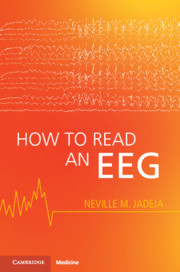Book contents
- How to Read an EEG
- How to Read an EEG
- Copyright page
- Dedication
- Contents
- Figure Contributions
- Foreword
- Preface
- How to Read This Book
- Part I Basics
- Chapter 1 Introduction
- Chapter 2 Polarity
- Chapter 3 Montages
- Chapter 4 Localization
- Chapter 5 Active Reference
- Chapter 6 Frequencies and Rhythms
- Chapter 7 Maturation
- Chapter 8 Normal Adult EEG
- Part II Interpretation
- Part III Specific Conditions
- Appendix How to Write a Report
- Index
- References
Chapter 7 - Maturation
from Part I - Basics
Published online by Cambridge University Press: 24 June 2021
- How to Read an EEG
- How to Read an EEG
- Copyright page
- Dedication
- Contents
- Figure Contributions
- Foreword
- Preface
- How to Read This Book
- Part I Basics
- Chapter 1 Introduction
- Chapter 2 Polarity
- Chapter 3 Montages
- Chapter 4 Localization
- Chapter 5 Active Reference
- Chapter 6 Frequencies and Rhythms
- Chapter 7 Maturation
- Chapter 8 Normal Adult EEG
- Part II Interpretation
- Part III Specific Conditions
- Appendix How to Write a Report
- Index
- References
Summary
Neonatal EEGs should be interpreted in the context of postmenstrual age (PMA) and physiological state (awake, active, or quite sleep). Sustained continuity is the hallmark of maturation. Early preterm records are discontinuous (trace discontinu) irrespective of state, whereas term records are near-continuous in all states. Between 30 and 37 weeks, the record becomes more continuous during wakefulness and active sleep but remains discontinuous during quiet sleep. Activite moyenne (continuous) is seen during wakefulness and active sleep in a healthy term neonate. Trace alternans is seen during quiet sleep in a healthy term neonate. At term about 50% of sleep is active, whereas in adults about 20% is REM sleep. Anterior dysrhythmia and enconches fontanelles are common graphoelements that occur between 32 and 44 weeks PMA. A reactive posterior dominant rhythm emerges after 3 months of age. Asynchronous sleep spindles appear before 3 months and synchronize by 6 months. The posterior dominant rhythm attains alpha range by 2 years of age. Hypersynchrony appears around 3 months and resolves by 3 years; rarely, it persists longer. It may be misidentified as generalized spike wave complexes.
Keywords
Information
- Type
- Chapter
- Information
- How to Read an EEG , pp. 40 - 52Publisher: Cambridge University PressPrint publication year: 2021
